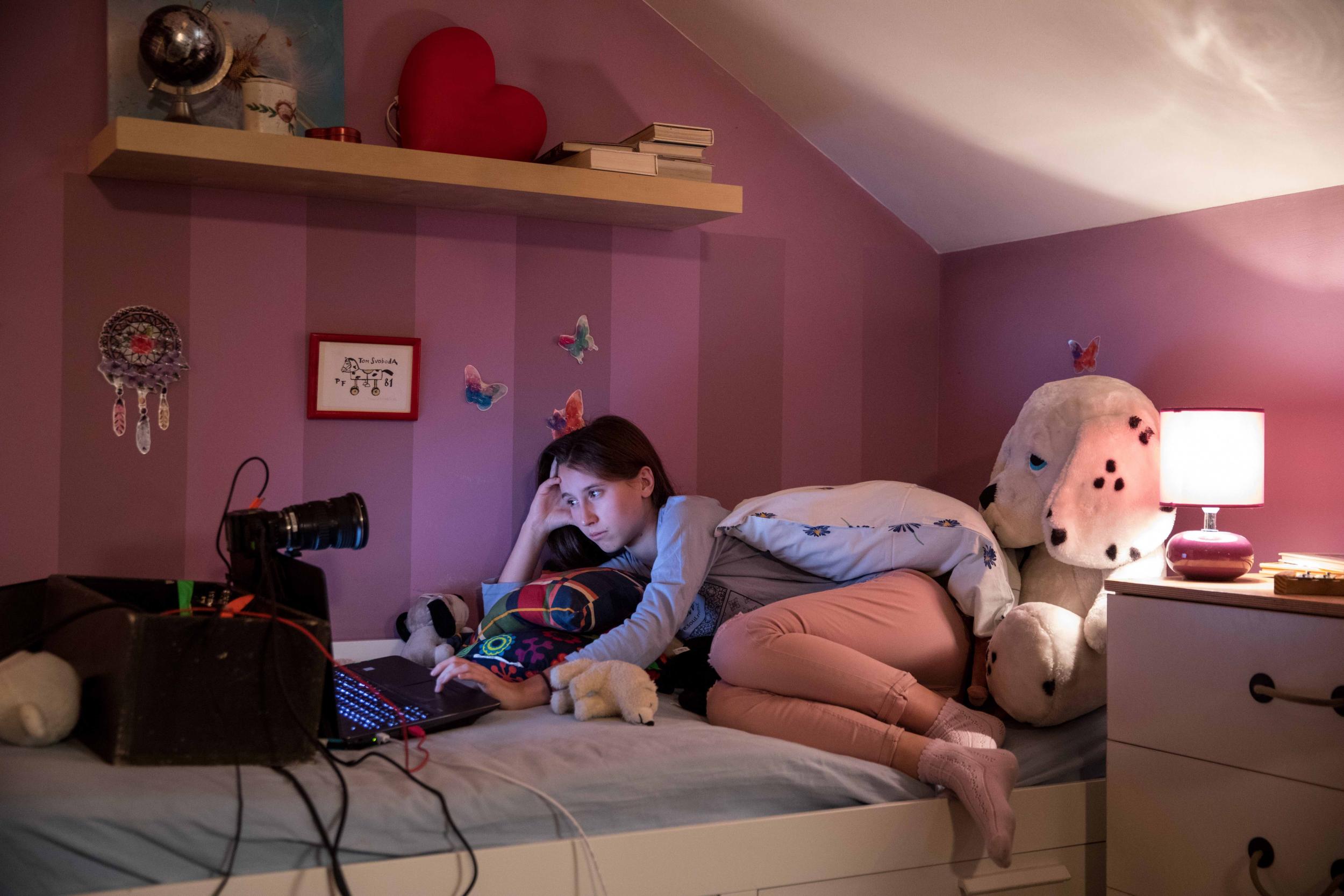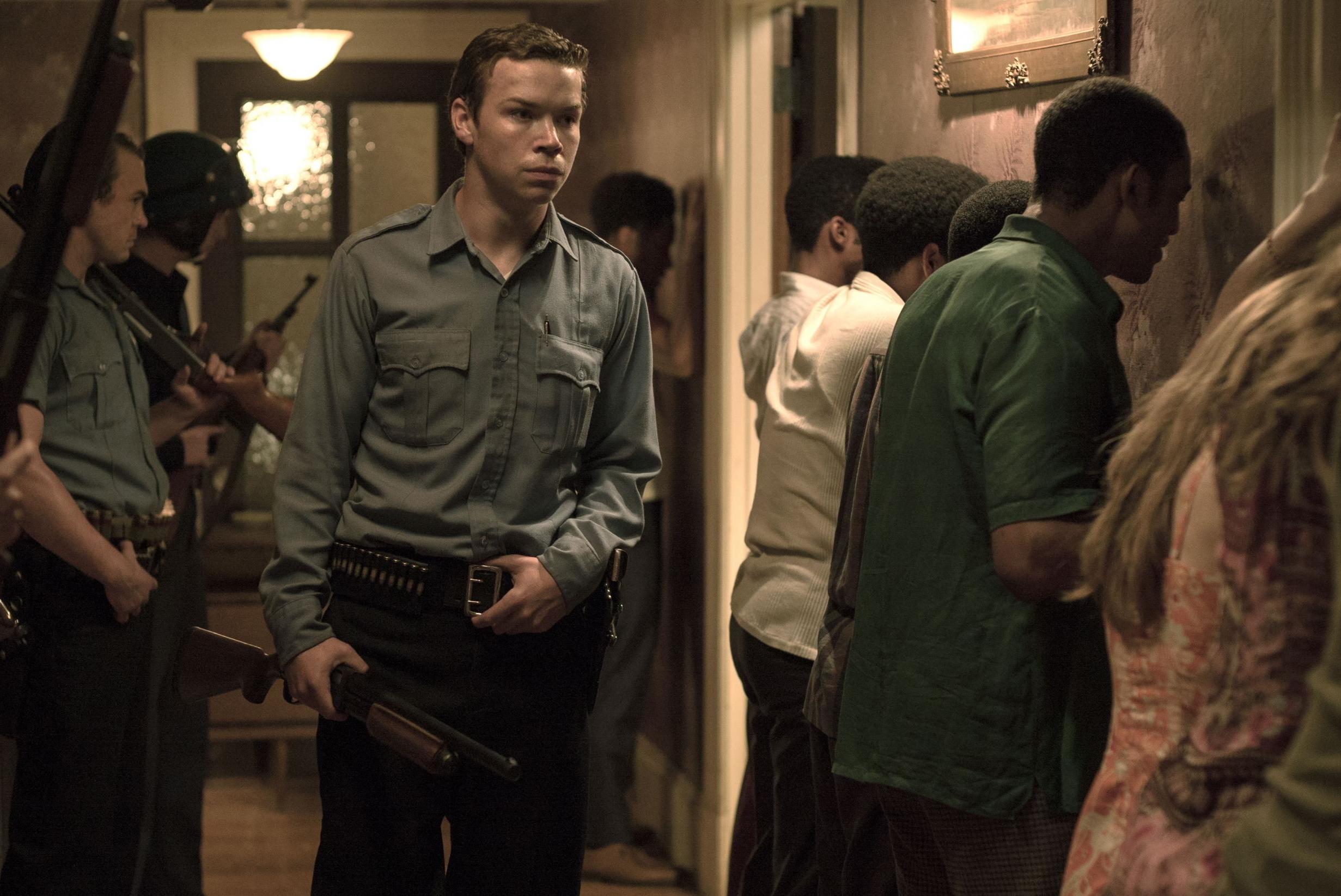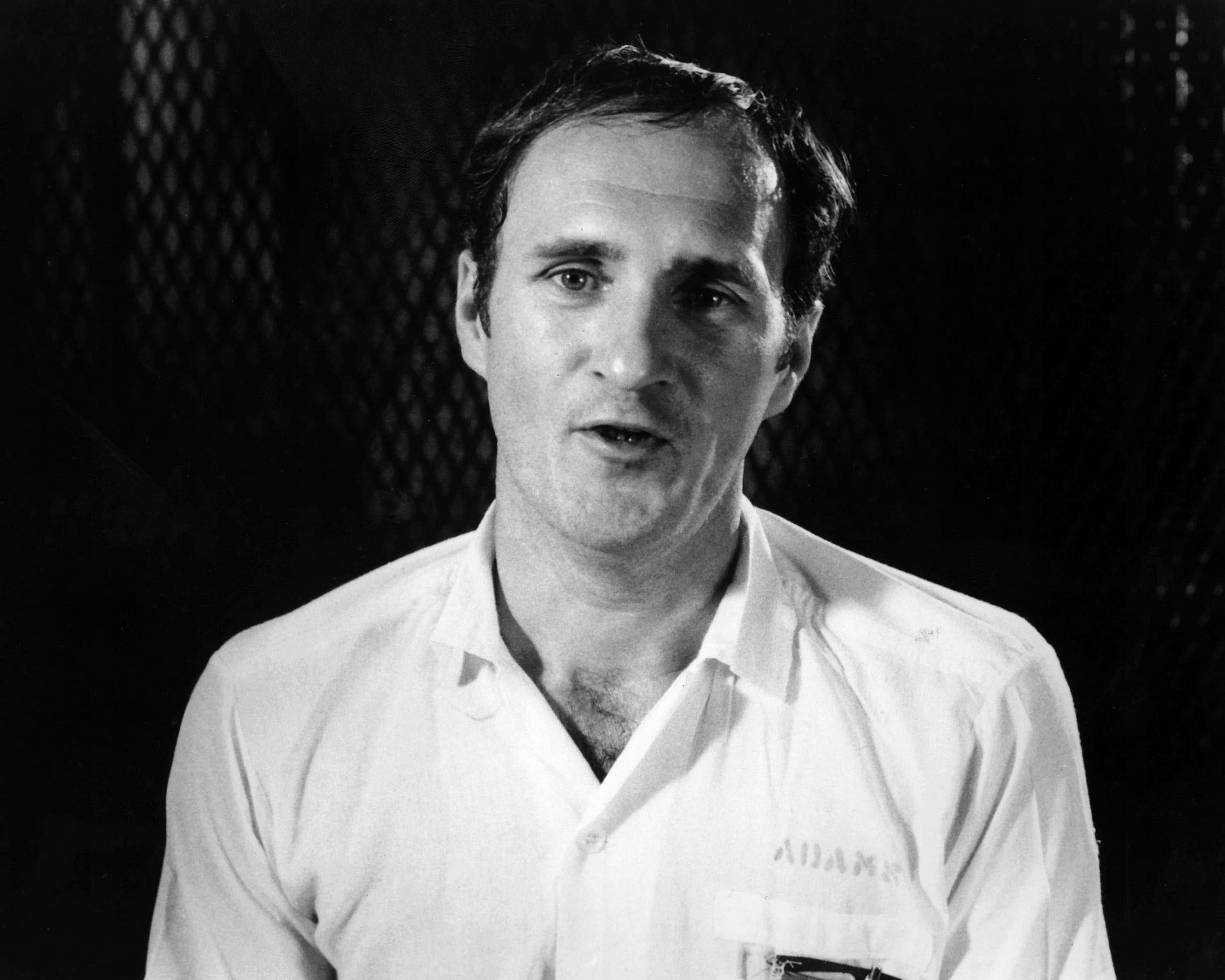How a hit Czech film might have helped catch nine criminals
Shocking new documentary ‘Caught in the Net’ joins a select group of films that have led to police investigations, writes Geoffrey Macnab

There is a certain grotesque comedy about the shocking new Czech documentary Caught in the Net, which received its digital international premiere this week through the online edition of CPH DOX, a documentary festival in Copenhagen. In the film, three youthful-looking adult actresses pretend that they are kids. The directors Barbora Chalupova and Vít Klusak recreate the women’s childhood bedrooms on a movie set and provide them with fake new social media profiles. The three then go online, following a very strict set of guidelines. They do not approach anyone. On every call, they start the conversation by saying they are 12 years old. They don’t “flirt, seduce or provoke”. Their reticence, though, doesn’t stem the stampede in the slightest. Over the 10 days of filming, thousands of men contact them, looking for sexual gratification.
You can’t help but be gobsmacked by the alacrity with which these men, many who are well into middle age, expose themselves over Skype, talk dirty, send nude photographs and try to cajole and blackmail the women into performing for them. What they think are private conversations are being watched and recorded by the filmmakers and a small army of psychologists, sexologists, lawyers and criminal investigators, standing just off set.
“Doesn’t it matter that I am 12?” the women continually ask. The men parry the question, saying they were 12 once too, or that it is their little secret, and “I don’t mind if you don’t”. One, based in the UK, promises to find the girl a school if she will come and live with him there. Another, who claims to be 50 but looks far older, says “that’s cool” when asked about the vast age difference between them. He reveals he has grandchildren aged 20 and 22.
Caught in the Net proved a full-blown phenomenon when it was released in the Czech Republic late last month. It broke box-office records while prompting investigations into the men who had unwittingly participated in the documentary. The reason it struck such a chord was clearly that it was uncovering experiences that have become completely commonplace. As we are told at the start of the film, “60 per cent of Czech children spend time online without any parental limits”, and 41 per cent of these children “confirmed they have received pornographic messages from another person”.
The scale of the online abuse became apparent even before filming began. Twenty-three young actresses attended the main casting session for the film. Nineteen of them revealed to the filmmakers that they themselves had experienced some form of online abuse in childhood.

Once shooting was underway, the film’s make-up artist was startled when she recognised one of the men contacting the actresses. He was a personal acquaintance. What surprised her, even more, was that the man’s job involved working directly with children. Here he was, off duty, bombarding them with obscene messages and photographs.
The film has an added urgency because it puts the viewers in the same position as the experts and investigators. We are watching and listening in on abusive online conversations that would normally be private.
Eventually, the girls agreed to face-to-face meetings with some of the men. It was at this point that the men’s behaviour slipped into potential criminality. Under Czech law, “establishing illicit contact with minors” can be punished by imprisonment of up to two years.
The predators in the documentary do eventually get their comeuppance. Towards the end of their meetings with the actresses, the women’s phones go off. They say their fathers are on the way. With no standing on dignity, the abusers flee as quickly as they can at this alarming news. In a separate incident, one man is apprehended outside his apartment by the film crew. When he realises that he has been caught on camera sending obscene images to someone he believes is 12, he tries to turn the focus back on the parents who allow their daughters to speak unsupervised to strangers like him.
Caught in the Net was made with the support of the authorities, among them the Czech police cybercrimes unit, local internet providers and broadcasters who wanted to generate public awareness of an issue still rarely discussed. Alongside its cinema screenings, the film has been shown in an edited, less explicit version at almost every school in the country.
The distributor Aerofilm said recently that nine of the predators featured in the film are under police investigation. Caught in the Net thus joins the select group of films that have helped catch criminals. It remains to be seen whether any of the predators will serve time. One guesses that they will accuse the filmmakers of entrapment. They may also attempt to defend themselves on the basis of the actual ages of the “girls”, who may have pretended to be 12 but were all 18 or older.
Generally, movies are too unwieldy and too slow in their gestation to catch criminals. By the time they have been shot, edited and released, the criminals will long since have scarpered. They can’t match the rapid candid camera style stings of shows like NBC’s reality television series, To Catch a Predator, in which the apprehension of the adult sex offenders is the reason for the show existing. Caught in the Net doesn’t feature any arrests.
“It’s a real torrent of every illegal act and crime against children one can imagine,” Frantisek Vyskocil, the on-set lawyer in Caught in the Net, says of the predators. He wants them in jail. “What I’ve seen here is the lowest filth I’ve ever come across.”

Vyskocil, though, is missing the point. This may be the “lowest filth” but the actions of the online abusers are also completely unexceptional. “During 10 days of filming in a studio, a total of 2,458 men contacted our three actresses,” the end credits reveal. Charging a handful of these men with criminal behaviour won’t stop the others. If one or two of them are successfully prosecuted, it will make only a very small inroad into the actions of the thousands who called the actresses and didn’t hang up, even when told they were speaking to minors.
With Caught in the Net, the filmmakers have lifted up a stone and revealed the miasmatic world underneath. This is the best that most movies can do and is surely the main reason the documentary was made. Cinema can often hold up a mirror to historical injustices. There have been numerous examples of documentary series such as Andrew Jarecki’s The Jinx: The Life and Deaths of Robert Durst (2015), Making a Murderer (2015), and films like Errol Morris’s The Thin Blue Line (1988), that have turned up new evidence in old murder cases. In recent years, feature documentaries have often done work that might previously have been undertaken by investigative journalists in exposing war crimes from sexual violence, industrial pollution, corporate and boardroom skullduggery to political corruption.
The best films can shift long-held perspectives or alert viewers to atrocities they may not even have previously known about. For example, without Joshua Oppenheimer’s The Act of Killing (2012), few westerners would have been aware of the mass slaughter of communist members and sympathisers that took place in Indonesia in the mid-1960s.
On their own, though, films haven’t been very effective at catching criminals. They are much better at providing context and insight about criminal behaviour. Kathryn Bigelow’s Detroit (2017) provides a searing account of the criminal actions of Detroit authorities and cops during the race riots in the city in 1967. Nobody watching the movie will be in any doubt that the young Detroit police officer played by Will Poulter should face jail for his murderous and sadistic actions. However, the film appeared 50 years after the events it portrayed, Poulter’s character was based on a number of different prototypes and there was nothing Bigelow or her writer Mark Boal could do about injustices from so long ago. For all the anger they stirred up about the brutality of the Detroit police towards innocent bystanders, this was still largely an academic exercise.
Caught in the Net is likely to have an immediate impact. It has provoked a nationwide debate, albeit one muted in recent weeks by coronavirus. Everybody had a stake in the conversation: parents, teachers, scientists, health experts, cops and, of course, the kids themselves. In spite of its queasy and disturbing subject matter, the film is accessible and doesn’t preach. Alongside its many grim and exploitative moments, it has humour and pathos too. That is why people are paying attention. The producers and distributors aren’t naive enough to think that foreign audiences will be interested in Czech stories but they do know that the online abuse they capture on camera happens all around the world, and not just in Prague and Brno. That is why they are looking to licence the format, as if this was a game show, and to encourage other countries to make their own versions of Caught in the Net. Whether or not the new films (if they’re commissioned) lead to the imprisonment of online predators, they are bound to generate far greater awareness of a subject that parents have been loath to investigate too closely.
‘Caught in the Act’ is screening this week at the online version of CPH DOX (en.cphdox.dk)
Join our commenting forum
Join thought-provoking conversations, follow other Independent readers and see their replies
Comments